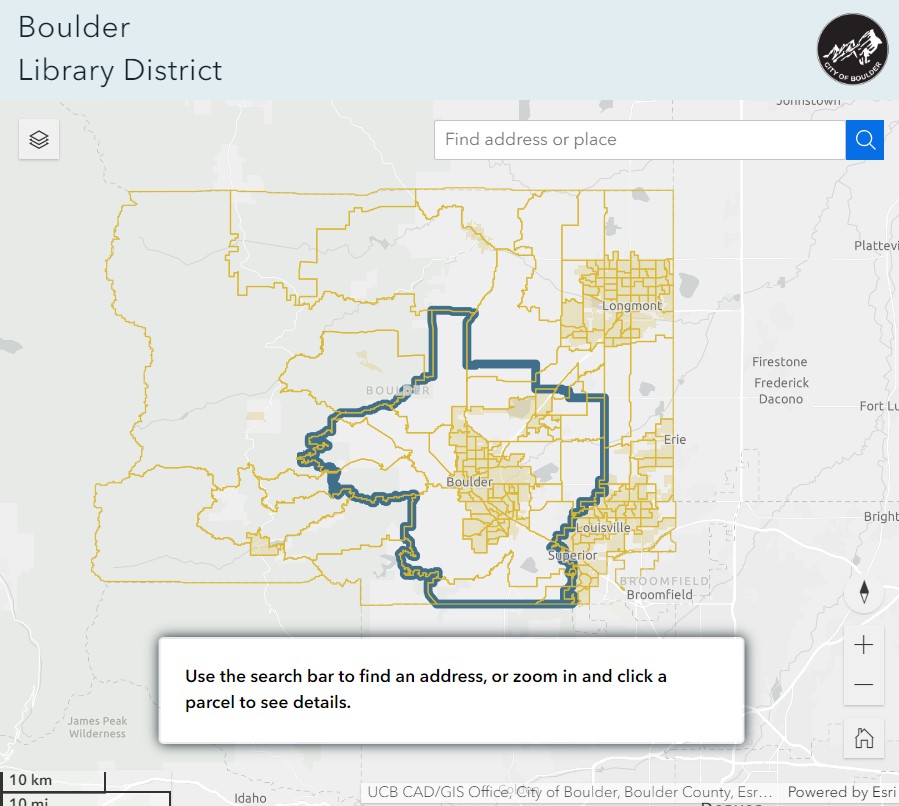Boulder Public Library District Formation
Content Sections
Overview
A library is more than a place to borrow a free book. It is a vital civic space for people to meet and have conversations, study, hang out with friends, and engage in fun, educational activities and cultural experiences. It is evident from increased usage and requests for expanded programming that the community values its public libraries.
Timeline
For the past six years, the City Council, Library Commission and City staff have engaged in public discussions exploring numerous ways to adequately fund the library, including finding revenue streams beyond sales taxes as the primary source of library funding. Memos to council about library funding and creating a library district are available.
- Nov. 8, 2022 – Voters approve Boulder County ballot measure 6c to form the Boulder Public Library District
- Nov. 29, 2022 – County Commissioners Marta Loachamin and Claire Levy were appointed to serve on the Library District Board of Trustees Selection Committee.
- Dec. 1, 2022 – Boulder City Council members Aaron Brocket and Nicole Speer were appointed to serve on the Library District Board of Trustees Selection Committee.
- Dec. 15, 2022 – Chief of Staff to the Boulder County Board of County Commissioners (BOCC) notifies the BOCC of the initial certification of the 3.5 property tax mill levy approved by voters.
Estimated timing for next steps of the transfer to a library district:
- January 2024 – Boulder Public Library staff members become Boulder Public Library District Employees.
Frequently Asked Questions
What is a library district?
A library district is a political subdivision of the state, created by one or more governmental entities and governed by a Board of Trustees appointed by these entities. Dedicated property tax revenues fund the library district and voters within the district boundaries must approve any new or increased taxes.
It is the most common form of governance for public libraries within the State of Colorado and for communities similar in size to Boulder, with 56 district libraries throughout the state. Pueblo, Colorado Springs, Arapahoe and Adams County, Greeley and Fort Collins have formed library districts.
Who are the Board of Trustees?
Trustees are community members who reside in the library district legal service area who are appointed to serve and govern the library district. Trustees are selected by a committee whose members are from the Boulder City Council and the Boulder County Board of County Commissioners (BOCC). The appointment of the Trustees selected by the committee is ratified by a 2/3 vote from City Council and the BOCC.
What happens if there is a vacancy on the Board of Trustees?
The establishing entities (City Council and BOCC) and the library district, represented by the Board of Trustees, must agree on one of two options from the Colorado Library Law (CRS 24-90-108) to fill vacancies: either the board recommends new trustees or a committee with members from the establishing entities recommends new trustees.
In both cases, trustees are appointed by ratification of a two-thirds majority vote from each establishing entity. If either City Council or the BOCC fails to act within sixty days of receiving a recommendation from the committee, the trustee recommended by the committee will be considered appointed to fill the vacancy.
What are the responsibilities of the Board of Trustees?
The powers and duties of the Library District Board of Trustees are detailed in Colorado Library Law (CRS 24-90-109) and include:
- Adopt Board of Trustee bylaws, rules and regulations
- Have custody of all property of the library
- Employ the Library Director
- Adopt an annual budget and make appropriations
- Accept gifts of money or property for the library
- Hold and acquire land by gift, lease or purchase for the library
- Borrow funds and enter into contracts for library purposes
- Submit an annual report to the establishing entities and the state library
What does the intergovernmental agreement include?
The Colorado Library Law (CRS 24-90-107) states that if voters approve a petition-proposed library district, involved parties must negotiate an intergovernmental agreement (IGA). This legal agreement between the establishing entities and the library district include the rights and responsibilities of the involved groups regarding:
- Ownership of real property (such as land and facilities) and personal property (such as furniture, books, computer equipment, etc.)
- Transfer of staff
- Provision of administrative services during the transition
- Financing of library operations during the transition
- The method of trustee selection
- Other necessary terms and conditions as may be determined by the establishing entities and the district
What new services could the Boulder Public Library District offer?
The 2018 Library Master Plan outlines funding needs and new services the Library District Board of Trustees may consider over the next few years, including:
- Address the facilities maintenance backlog
- Restore library hours to pre-COVID 19 pandemic levels
- Restore Carnegie Library for Local History staff positions and resume open hours
- Restore staff positions for BLDG61 Makerspace
- Increase staff to support programs and rental of the Canyon Theater
- Expand the BoulderReads family literacy program
- Open a Gunbarrel Corner Library
- Expand early literacy and outreach programs to Latinx community members
What is the approved property tax mill levy for the library district?
Beginning in 2023, the Boulder Public Library District will receive property tax revenues of $17,520,485 annually from the 3.5 mill levy approved by voters.
Community members residing within the library district can calculate property tax estimates on the Boulder County Assessor website or by using this interactive map. Tax revenue collected from the mill levy will enable the Board of Trustees to address library funding needs and implement new services over the next few years.

Key Resources:
- Library District Advisory Committee (LDAC) – members and meetings
- Council Memos
- 2018 Library Master Plan
- Annual Reports




